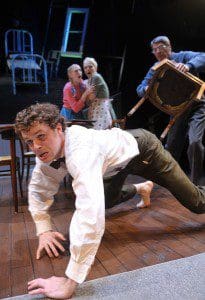
The most heartbreaking moment in David Farr and Gísli Örn Gardarsson’s theatrical adaptation of The Metamorphosis (at the Aurora Theater, in its first professional American production) is at the beginning, when Gregor’s sister Grete (Megan Trout) discovers that Gregor’s shoes are still on the carpet. It is past seven o’ clock; Gregor should be long gone to work. The family stops short; they had just finished setting three tidy places for breakfast. They stare at the shoes in shared astonishment, bordering on horror. Even before Gregor’s repulsive transformation, his family is accustomed to eating without him. They are happiest when he isn’t there.
Kafka’s novella is told from the perspective of its main character — of Gregor’s family, we only know what we can overhear through the bedroom door. This new adaptation inverts that perspective, focusing on Gregor’s family. Aurora’s intimate space (set by Nina Ball) creates a feeling of stifling familial claustrophobia. A crowded living and dining area on ground level connects to Gregor’s bedroom by a poky set of stairs. The bedroom, open to the audience, is pitched at an angle towards the stage floor. On that first morning, Gregor (Alexander Crowther) struggles to get out of bed (the eight o’ clock train has my name on it!), sliding down the length of the bed frame and ending up in a heap at the footboard, cleverly suggesting the plight of an insect on its back.
Did we mention there’s no bug suit? Crowther conveys Gregor’s inhuman appearance with a crouching physicality, at once fluid and mechanical. More mantis than cockroach, he hops nimbly from the floor to the arm of a chair to the top of a table; in a panic, he crabwalks backwards up the stairs. His face takes on a hollow-eyed, alien cast — his jaw locked, his color gone, his eyes unblinking. He looks like a creature, but a creature not altogether well. As he grows more comfortable in his new body, he takes to dangling from the walls, making use of a metal lattice at the back of the set, and looking like an enormous, malevolent spider perched above his family.
Apart from Gregor’s movement, our understanding of his transformation is based solely on the reaction of his family. The audience can hear him speaking rationally in a normal voice — the contrast between his reasoned, even eloquent speech and his bizarre physicality is both tragic and absurd. To the other characters on the stage, however, his voice is unbearable. They beg him to stop the awful “din” and “racket” he is making. One imagines terrifying, subhuman sounds issuing from Gregor in the place of speech: the hissing of insect wings, alien exoskeletal clicks ratcheted up to ear-splitting volume. Each family member responds differently to Gregor’s “condition.” Mother (Madeline H.D. Brown) weeps and faints. Father (Allen McKelvey) rages. Grete takes it upon herself to come between her parents and her misshapen brother, for whom she feels something like pity mixed with disgust and resentment. She feeds him, cleans up after him, and, at the beginning, even seems to understand some of what he’s saying. This adds weight to the implication that the family’s inability to understand Gregor, and perhaps their entire perception of him, is some kind of cruel collective whim.
The program informs us that the play will take place in “a small middle-American city in what may be the mid twentieth century.” Makes sense. What could be more Fifties, or more American, than closeted family weirdness? But Aurora’s Americanization of the play doesn’t come off, perhaps because it relies almost entirely on Madeline H.D. Brown’s manically cheerful, perpetually verging on a meltdown portrayal of Mother, a treacly caricature that brings to mind Laura Linney in The Truman Show. Patrick Jones’ Mr. Fischer affects a toffee-nosed British accent, which, while hilarious, rings false in a middle American sales clerk, no matter how pretentious. And there’s a certain Old-World preciousness to the writing, found both in the original novella and Farr’s adaptation. Would you find “state gardens” in Westchester? Would we call a music school a “conservatory?”
In the end, the Samsas can’t cope. They say aloud what’s been in the air the whole time — that it would be better if Gregor were dead. Suddenly unified and strong, no longer weakened by the hypocrisy of pretending they can live with the “creature,” they even begin to speak in one voice. The play takes on a terrible clarity. Mother, her hysteria gone, calmly describes a ditch behind the tenements, where people throw away old mattresses. Grete, who, until now, has been the family’s last vestige of conscience, declares that the thing in Gregor’s room is not her brother. Here is what makes this play original, what sets it apart from Kafka’s text. It’s not about Gregor, not at all. It’s about the family that failed to love him.
The Metamorphosis, directed by Mark Jackson, runs through July 24 at the Aurora Theater in Berkeley.

i just read four google search pages of reviews for this play. i like this one